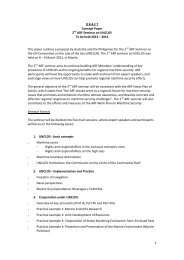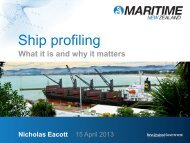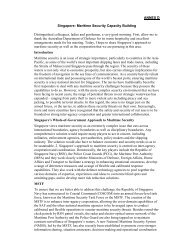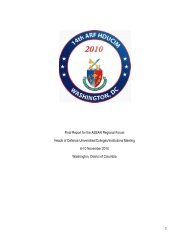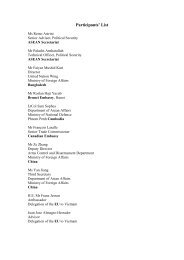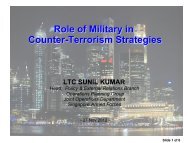Maritime Domain Awareness and Ship Profiling.pdf - ASEAN Regional ...
Maritime Domain Awareness and Ship Profiling.pdf - ASEAN Regional ...
Maritime Domain Awareness and Ship Profiling.pdf - ASEAN Regional ...
You also want an ePaper? Increase the reach of your titles
YUMPU automatically turns print PDFs into web optimized ePapers that Google loves.
<strong>ASEAN</strong> REGIONAL FORUM (ARF)<br />
WORKSHOP ON SHIP PROFILING<br />
15-16 APR 2013<br />
Royale Chulan Hotel<br />
Kuala Lumpur<br />
Malaysia<br />
MARTIN A. SEBASTIAN<br />
Centre Head<br />
CENTRE FOR MARITIME SECURITY AND DIPLOMACY (CMSD)<br />
MARITIME INSTITUTE OF MALAYSIA (MIMA)<br />
sebastian@mima.gov.my<br />
1
The <strong>Maritime</strong> <strong>Domain</strong><br />
• The maritime domain is a crucial source of livelihood<br />
for the population. Its characteristics must resonate<br />
with the political <strong>and</strong>/or public consensus over<br />
governance as well as promote coordination <strong>and</strong><br />
cooperation among security related <strong>and</strong> civil<br />
institutions.<br />
2
<strong>Maritime</strong> Security<br />
• Good order at sea encourages the free flow of sea‐borne<br />
traffic. It ensures that nations can pursue their maritime<br />
interests <strong>and</strong> develop their maritime resources in an<br />
ecologically sustainable <strong>and</strong> peaceful manner in<br />
accordance with international law <strong>and</strong> practice.<br />
• <strong>Maritime</strong> security is a major issue for shipping companies,<br />
legal advisors, risk management firms <strong>and</strong> relevant<br />
international organisations <strong>and</strong> authorities.<br />
• Security concerns may vary in types of low‐intensity<br />
conflicts related to the sea.<br />
3
Type of Security Concerns<br />
• A wide spectrum ranging from attack on maritime<br />
communities, illegal cross‐border movement of goods,<br />
people <strong>and</strong> illegally harvested forestry products, illegal<br />
exploitation of marine resources, marine pollution,<br />
maritime fraud <strong>and</strong> illegal broadcasting <strong>and</strong><br />
s<strong>and</strong>mining.<br />
• These criminal offences, though connected to the sea<br />
or the ship (or fixed structure on the sea‐bed), have<br />
links with the shore<br />
4
The Need for <strong>Maritime</strong> <strong>Domain</strong><br />
<strong>Awareness</strong><br />
• Armed robbers, pirates <strong>and</strong> terrorist who no longer merely<br />
hijack <strong>and</strong> steal cargoes, they also take hostages, kills security<br />
forces <strong>and</strong> dem<strong>and</strong> ransom, sometimes even part of a<br />
country’s sovereignty.<br />
• The illegal movement of people <strong>and</strong> goods have a devastating<br />
impact through increased crime <strong>and</strong> implicates the revenue.<br />
• Given the incredible numbers of people <strong>and</strong> goods cascading<br />
over the <strong>Maritime</strong> <strong>Domain</strong>, how do we filter bad from good,<br />
<strong>and</strong> the dangerous from the benign? <strong>Maritime</strong> <strong>Domain</strong><br />
<strong>Awareness</strong> is duly needed to include awareness, prevention,<br />
response, <strong>and</strong> consequence management.<br />
5
• <strong>Awareness</strong> involves recognising the threats well in advance,<br />
<strong>and</strong> anticipating our vulnerabilities.<br />
• In the <strong>Maritime</strong> <strong>Domain</strong>, it's about knowledge of ships,<br />
people, <strong>and</strong> cargo. Access to detailed intelligence about<br />
adversaries, <strong>and</strong> sharing that information more effectively<br />
among agencies domestically <strong>and</strong> with international<br />
partners in both the private <strong>and</strong> public sectors.<br />
• Without better awareness, more stringent actions with<br />
regards to prevention <strong>and</strong> response will close down<br />
economy <strong>and</strong> threaten economic security<br />
6
Security Response<br />
• In Malaysia’s view, an assertion underpinning in<br />
security response is that legitimate commerce,<br />
criminals, pirates <strong>and</strong> armed robbers as well as<br />
international terrorist organizations, all use the<br />
maritime environment for either the movement of<br />
goods, people, money or reach their political goals.<br />
• Malaysia has an obvious interest in protecting freedom<br />
of movement for the first group of users, prosecuting<br />
the second, <strong>and</strong> defeating the third.<br />
7
Addressing the Concerns<br />
• Flag States, Coastal States, Port States, user states <strong>and</strong><br />
other stakeholders cooperation in the surveillance <strong>and</strong><br />
interdiction of lawless actors in the <strong>Maritime</strong> <strong>Domain</strong><br />
have to be coherent in addressing the threat .<br />
8
Malaysia <strong>Maritime</strong> Security<br />
Architecture<br />
• The Royal Malaysian Navy <strong>and</strong> The Royal Malaysian<br />
Airforce – Safeguarding Sovereignty<br />
• The Malaysian <strong>Maritime</strong> Enforcement Agency –<br />
Asserting Sovereignty<br />
• The Marine Department ‐ Port States Control – ISPS<br />
Code<br />
9
The ISPS Code<br />
• The Code is to address <strong>Maritime</strong> Terrorism post 9/11.<br />
<strong>Maritime</strong> used to address port security, vessel security<br />
<strong>and</strong> facility security.<br />
• This m<strong>and</strong>ate is undertaken by, in Malaysia’s case, the<br />
Marine Department.<br />
10
ISPS Code<br />
• The International <strong>Ship</strong>s <strong>and</strong> Port Facility Security<br />
Code (ISPS Code) established security requirements<br />
for applicable waterfront facilities, commercial ships,<br />
<strong>and</strong> port areas.<br />
• Although these regulations have improved maritime<br />
security, gaps remain to be exploited by organised<br />
crime.<br />
11
• Skeptics have wondered if the security initiatives are<br />
appropriately tailored to the level of threat faced by<br />
the maritime sector in the context of today’s security<br />
realities.<br />
• Then again, what are those realities….<br />
13
What matters ….<br />
• Pirates<br />
• Armed Robberies<br />
• Organised Crime<br />
• Risk Mitigation<br />
• BMP<br />
• <strong>Ship</strong> hardening ‐ Citadel<br />
• Armed Guards<br />
14
So what is needed…<br />
• <strong>Maritime</strong> <strong>Domain</strong> <strong>Awareness</strong><br />
• Shared <strong>Awareness</strong> –Inter‐Agency Corporation, Liaison with<br />
Non‐Government organisations, Community Policing (Whole<br />
of Nation Approach)<br />
• Sense Making – Trend/Pattern analysis. Using networked<br />
capabilities operated by domain experts <strong>and</strong> analysts to be<br />
ahead criminal networks<br />
• Continue the efforts under the current ISPS regime for<br />
Ports<br />
15
Increased Port Security, comforting<br />
or Choking?<br />
• Proliferation security schemes introduced since 9/11<br />
has enhanced security in leaps <strong>and</strong> bounds<br />
• Measures has increased resistance <strong>and</strong> complaints<br />
form Port Stakeholders<br />
• No terrorist strikes at Ports since 9/11<br />
16
Reason for resistance from the<br />
Industry<br />
• Financial costs due to equipment purchase<br />
• Reduction of operational speed <strong>and</strong> efficiency<br />
• Bottlenecks along supply chain as a result of more<br />
security procedures<br />
• Arrest, cautioning <strong>and</strong> turning away of ships for non<br />
compliance<br />
• Non compliant ports bypassed by shipping lines<br />
resulting in loss of revenue<br />
• Ports ranked according to security measures in<br />
competitive index.<br />
17
Regime Building vs Increased<br />
Security<br />
• <strong>Maritime</strong> <strong>Domain</strong> <strong>Awareness</strong> is focussed on Intelligence sharing<br />
through collaborative works among civil agencies, international<br />
agencies, industry, shipping community <strong>and</strong> national law<br />
enforcement agencies. The same awareness can cater for a range<br />
of security concerns<br />
• ISPS Code designed principally to counter <strong>Maritime</strong> Terrorism,<br />
an action for political gain. The Global War on Terror (GWOT)<br />
has been successful in breaking down the terrorist structure <strong>and</strong><br />
cells.<br />
• Global security l<strong>and</strong>scape has not witnessed terrorism targeting<br />
ports. Current focus on law enforcement architectures which are<br />
adequate to address criminal activity. Current ISPS regime<br />
adequate to address security.<br />
18
Conclusion<br />
• Security in Ports are well entrenched with current security regimes.<br />
The main focus is on law enforcement where intelligence sharing plays<br />
a vital role.<br />
• Ports are increasingly resistant to add another layer of security for<br />
financial reasons, competitiveness, more traffics, rapid processing.<br />
• <strong>Ship</strong>s are already burdened with a number of security regimes. The<br />
present ones are more than adequate.<br />
• <strong>Ship</strong> <strong>Profiling</strong> is not necessary for security but safety, as required<br />
under the Tokyo MoU<br />
• To enhance security, Regime Building towards better MDA will better<br />
benefit Ports.<br />
19


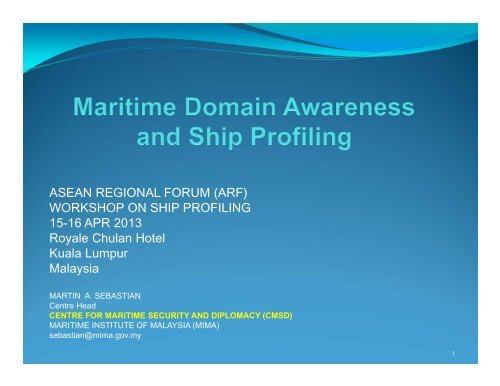
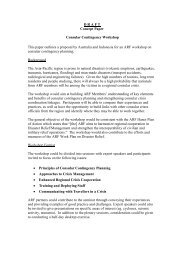
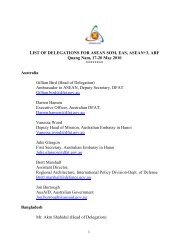
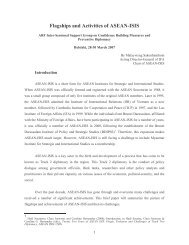
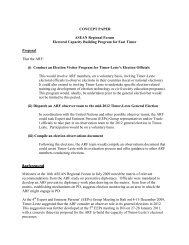
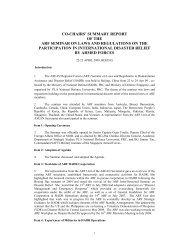
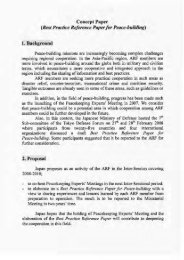
![10 ASAIN Presentation [Pakistan].pdf - ASEAN Regional Forum](https://img.yumpu.com/50649810/1/190x143/10-asain-presentation-pakistanpdf-asean-regional-forum.jpg?quality=85)
